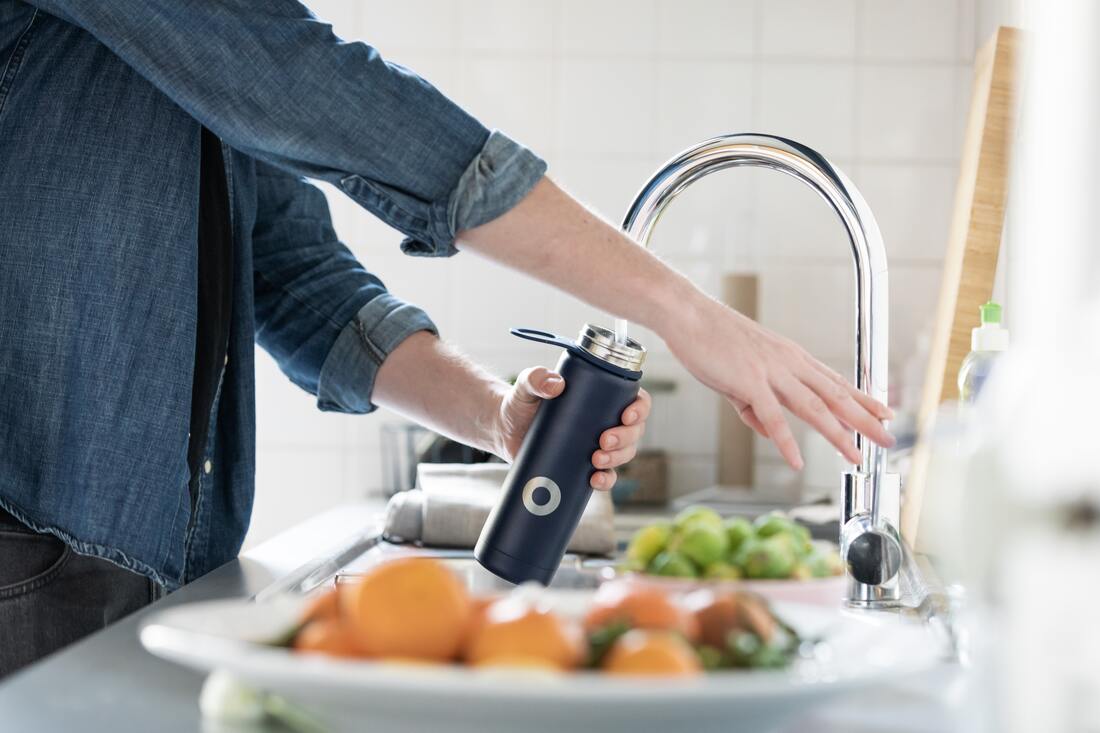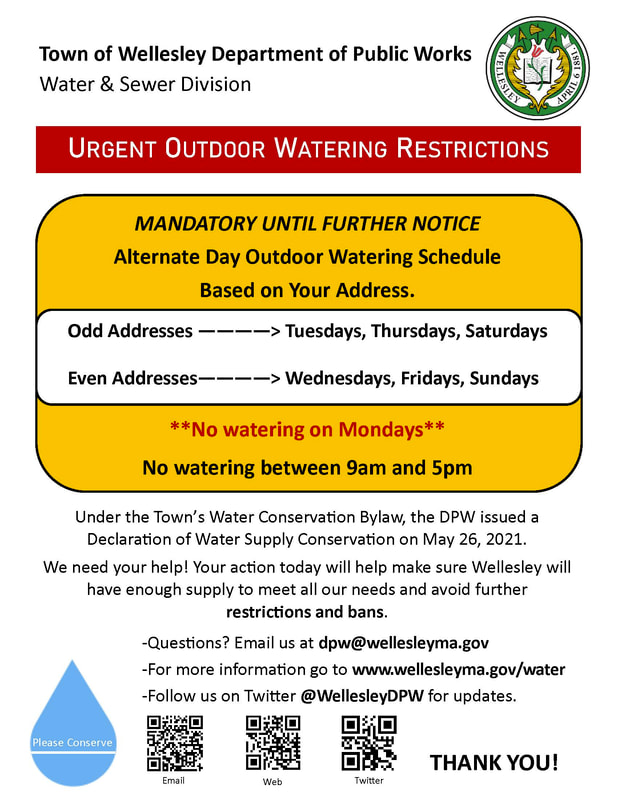|
From the Town of Wellesley:
Mandatory outdoor watering restrictions are in effect for all Wellesley citizens and business owners for Summer 2024. The requirements include alternate day outdoor watering schedules for homes and businesses, a ban on outdoor watering between 9 a.m. and 5 p.m., and a request to reduce the amount of outdoor watering time by 20 percent. These efforts are needed to ensure that Wellesley’s water supply is sufficient to protect the health and safety of residents, including providing enough water necessary to fight fires. This is a preventative measure to ensure adequate water supply throughout Town while the PFAS filter media is being replaced at the Morses Pond Groundwater Treatment Plant. Typically, this treatment plant supplies over 750,000 gallons of water per day to homes and businesses. We anticipate that the plant will be down between 1 to 3 weeks. If our region experiences drought conditions in the coming months, additional restrictions may be required. Outdoor Water Use Alternate Day RestrictionsBased upon street address numbers, essential and nonessential outdoor water use IS ALLOWED according to the following schedule:
Essential uses of water are:
To help maintain appropriate water levels in Town storage tanks, the DPW is also asking residents to reduce the amount outdoor watering time by 20%. For example, if you have an automated irrigation system with a 15-minute watering time in each zone, you should reduce each zone’s watering duration by at least 3 minutes. Additional water conservation recommendations include checking for and repairing any water leaks in irrigation systems, faucets, showerheads, and toilets. You don't need to really celebrate Energy Star's 'holiday', but we want you to be aware of the savings potential out there when you switch to an ENERGY STAR® certified heat pump water heater.
Heat pump technology is high-performing and super-efficient, so you’ll save on lower utility bills. Energy Star says "a family of four can save up to $550 annually and more than $5,600 over the product’s lifetime. Add tax credits of up to $2,000 and available utility rebates and the payback is almost instantaneous."* information from Energy Star Program If you currently have an old electric resistance water heater, you are just throwing away money on energy bills every month. If you have a gas water heater, just think how making the switch will help contribute to a clean energy future. Email info@SustainableWellesley for more information. Wellesley’s Department of Public Works Water Division is making it easy for its customers to make wise water choices. Simply visit here to and activate your account in the Town's Water
Customer Portal. Use the Portal to access your historical water use data, current water usage details, and information to help you identify leaks in the home. Efficient water use is good for your wallet and good for Wellesley’s natural resources. The Water Customer Portal makes it easy to be a smart water user by allowing you to: • Compare your hourly, daily, and monthly historical use. • Identify ways to reduce your use and save on your bill. • Sign up to receive notifications of high water use and potential leaks. • Create a profile for your home or small business that can help you understand your energy and water usage and provide better recommendations for reducing your usage and saving money. “By using the Water Customer Portal, customers can gain insights into their consumption and find ways to reduce water use.” said Bill Shaughnessy, Water and Sewer Superintendent. “Smart water use is in everyone’s interest and the Water Customer Portal is a personalized, data-driven tool for understanding water use, identifying leaks and high usage, and promoting efficiency.” The new Water Customer Portal also helps support Action NR2 in Wellesley’s new Climate Action Plan: “advance the smart and efficient use of water by all community members.” Pumping, heating, and treating water consumes energy. So conserving water reduces our carbon footprint. Water conservation also helps maintain vital water in ecosystems. The Climate Action Plan, completed in February 2022, provides a roadmap for achieving town-wide greenhouse gas emissions reduction goals, including the goal of net zero emissions by 2050. These goals, adopted by Town Meeting in April 2021, align with the State of Massachusetts and federal government carbon neutrality goals. Information on ways to conserve water during these drought conditions is here. The Wellesley Department of Public Works (DPW) needs your help to reduce the current demand for water in Wellesley and has issued a State of Water Supply Conservation Declaration. The decision requires residents and businesses to begin following specific water restrictions effective Monday, May 23, 2022. The requirements include a mandatory alternate day outdoor watering schedule for homes and businesses, a ban on outdoor watering between 9 a.m. and 5 p.m., and a request to reduce the amount of outdoor watering time by 20 percent. Complete details are included below.
According to DPW officials, the measures are needed to ensure that Wellesley’s water supply continues to protect the health and safety of residents, including providing enough water necessary to fight fires. Due to drier than normal conditions this spring, on May 11, the Massachusetts Executive Office of Energy and Environmental Affairs (EEA), declared a Level 1 – Mild Drought status for the Southeast Region. Additionally, water supplies in Town are lower than normal because the Morses Pond water treatment plant was taken offline in May 2021 after tests showed higher than allowed levels of PFAS6 substances. This treatment plant supplies over one million gallons of water per day to homes and businesses and its loss is causing a shortage in the system. While the Morses Pond treatment plant is scheduled to come back on line this June, these restrictions are necessary to ensure adequate supply for essential water use. “We’re asking for cooperation from everyone in the community by following these restrictions as we head into the summer months,” said DPW Director Dave Cohen. Outdoor Water Use Alternate Day Restrictions Based upon street address numbers, nonessential outdoor water use IS ALLOWED according to the following schedule: • Odd numbered addresses are restricted to Tuesday, Thursday, and Saturday. • Even numbered addresses are restricted to Wednesday, Friday, and Sunday. • Nonessential outdoor use of water on Monday is prohibited. Nonessential outdoor watering hours are restricted to before 9:00 a.m. and after 5:00 p.m. Outdoor watering is prohibited during the daytime to ensure adequate water supply for typical essential uses and to avoid loss through evaporation. Essential uses of water are: • For health and safety reasons • Irrigation to establish a new lawn and new plantings between the months of May and September • Agricultural operations to maintain livestock and crops • Irrigation of lawns, gardens, flowers and ornamental plants by means of a hand-held hose Nonessential uses are: • Irrigation of lawns via sprinklers or automatic irrigation systems • Washing of vehicles, except in a commercial car wash or as necessary for operator safety • Washing of exterior building surfaces, parking lots, driveways or sidewalks, except as necessary to apply surface treatments such as paint, preservatives, stucco, pavement, or concrete Reduce Use While Watering To help maintain appropriate water levels in Town storage tanks, the DPW is also asking residents to reduce the amount outdoor watering time by 20%. For example, if you have an automated irrigation system with a 15-minute watering time in each zone, you should reduce each zone’s watering duration by at least 3 minutes. Additional recommendations to help reduce water use include checking for and repairing any water leaks in irrigation systems, faucets, showerheads, and toilets. Visit the DPW webpages for more information on water conservation. The Natural Resources Commission also offers tips for healthy and sustainable lawn and landscape care. Impact of PFAS6 on Water Restrictions The DPW’s Water Division acknowledges that the current PFAS6 situation is a major reason for these new rules. PFAS6 is a new drinking water standard which tests for the sum of six PFAS compounds. PFAS are Perand PolyFluorAlkyl Substances, a group of numerous human-made chemicals used since the 1950s to manufacture stain-resistant, water-resistant, and non-stick products. This drinking water standard is set to protect against adverse health effects for all people consuming the water. “It’s important to note that the Morses Pond plant was the only one in Wellesley with higher than allowed PFAS6 levels. We have been working to implement a temporary remediation system at the Morses Pond plant and look forward to becoming operational in the coming weeks” said Water and Sewer Superintendent Bill Shaughnessy. “Since May 3, 2021, all water for Wellesley is coming from the Town’s two other treatment plants and from the Quabbin and Wachusett reservoirs operated by the Massachusetts Water Resources Authority (MWRA). All of the water provided to our residents meets all current MassDEP water quality standards.” Residents with individual concerns about PFAS should contact their physicians or other health professionals. For complete PFAS information, visit the DPW and MassDEP webpages. The Wellesley Board of Public Works is hosting a public forum on Thursday, December 16, 2021 to discuss Per- and PolyFluoroAlkyl Substances (PFAS) in its water system. The forum will take place from 7:30 p.m. to 9:00 p.m. via Zoom. Participants may register at www.wellesleyma.gov/pfasforum PFAS are a group of numerous human-made chemicals that were used since the 1950's in consumer products. These chemicals do not break down and studies have shown that long term exposure may impact public health.
Elevated levels of PFAS were detected in Wellesley's water system earlier this year. Addressing this problem will require several million dollars of new expenditures. The Board of Public Works welcomes input form the community to help determine next steps. The forum will include representatives from the Department of Public Works, Health Department, Massachusetts Department of Environmental Protection (DEP), and the Massachusetts Water Resources Authority (MWRA). Town consultants Environmental Partners and Weston & Sampson will be in attendance. The agenda includes a review of PFAS, the recently adopted regulatory standard for PFAS in our drinking water, an overview of the Town’s drinking water system, actions taken so far as well as planned temporary actions, and a discussion of potential long-term options to address this issue. The public can ask questions and provide input to help the Town with plans for addressing this challenge going forward. For questions or additional information, please contact DPW Director David Cohen, at 781-235-7600 x3300 or [email protected]. Additional PFAS information is available on the PFAS webpages on the Town of Wellesley website. Wellesley’s Water: Town seeks solutions to address high levels of PFAS in key water source10/24/2021
What will Wellesley do about PFAS in our water? What is the most prudent course of action?
This is a good time to educate yourself about where the water that runs throughout your home -- from your kitchen tap to outdoor hoses -- originates. Currently, Wellesley’s municipal water supply comes from 10 town wells and from the regional Massachusetts Water Resources Authority (MWRA). There are four wells near Morses Pond which represent about half of the water the town uses. Last spring, during mandated testing, Wellesley Department of Public Works (DPW) found that our Morses Pond well exceeded the Department of Environmental Protection (EPA) maximum allowable levels of per- and polyfluorinated alkyl substances (PFAS). Wellesley’s DPW swiftly moved to turn off that source and worked with a consultant to shape a plan for short- and long-term water safety. Why the concern? PFAS is also known as “forever chemicals” because they break down very slowly and are linked to cancer, kidney and liver problems, birth defects, and more. This week, Wellesley Special Town Meeting will debate and vote on whether the DPW can borrow $1.5 million through the Water Enterprise Fund for an interim solution and $5.3 million for a long-term solution to address the PFAS issue at the Morses Pond Water Treatment Plant. The ARTICLE: 6, MOTION: 1 is on page 8 here. These funds would be allocated to a specific solution. Here is the dilemma: Some residents in town (an infectious disease physician, PhD organic chemist, PhD and pesticide expert among others) have questioned whether the proposed granular activated carbon remediation system will sufficiently remediate all pollutants and have urged the town to start converting toward a cleaner water supply from the MWRA, which is sourced from the protected Quabbin Reservoir. One strong argument for this approach is that Welleslley's aquifer is surrounded by dense development and roadways adding to our groundwater contamination. However, it would take at least 3 years to add a second connection and increase present connectivity to the MWRA. What would we do in the meantime? The DPW has been thoughtful about this issue and has noted reasons why it may be prudent to continue to have more than one source of water. They also have noted the supply constraints caused by having the Morses Pond well offline, and expressed those constraints as part of the desire and goal to bring the Morses Pond well back on line using the interim solution noted above. Some suggest waiting until the next Town Meeting to allow time for more public discourse, and recommendations from State and Federal officials (the State is due to come out with comments before the end of the year, and the EPA is working to set enforceable drinking water limits and will work to regulate PFAS). One concern about waiting to decide on this issue is it may create a time lag on implementation of a solution, and possibly put Wellesley further back in the line as other towns and cities move quickly to remediate their water supplies. To learn more about PFAS read here from the EPA and watch this video clip from the Massachusetts Municipal Association (MMA). Be mindful that this is not just a cost issue (cost of MWRA water vs. cost of Wellesley’s water) but a health and safety issue. Actions for you:
Sustainable Wellesley encourages sustainable actions to protect our climate; reduce pollution of air, land and water; preserve biodiversity; minimize waste; and ensure environmental justice. |
Categories
All
|
Sign up for updates! |
Contact |
Support us! |
Follow us!Copyright © 2024 By Sustainable Wellesley
|








 RSS Feed
RSS Feed